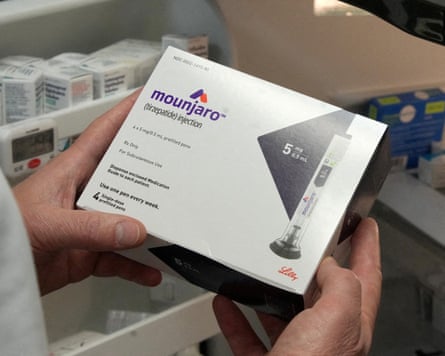
Obesity was once medicine’s Cinderella subject with some questioning whether the condition should even be viewed as a biological disorder. But the arrival of a new class of appetite-suppressing drugs such as Ozempic and Wegovy has transformed obesity treatment into the most scientifically exciting and commercially lucrative area of healthcare.
These drugs lead to dramatic weight loss, are shifting perceptions and, according to a series of results announced at the European Congress on Obesity (ECO) in Málaga this week, promise health benefits that extend far beyond weight management.
“It’s been an extraordinary week,” said Prof Susan Jebb, a public health nutrition scientist at the University of Oxford, who has been researching obesity treatments since the 1980s and who presented the findings at the ECO meeting.
“Obesity has been [in the background] for so long and it’s been such a slog,” she added. “These drugs have energised the field and it has happened so fast.”
Gamechanger for more than just obesity
First developed to help lower blood sugar levels as a diabetes treatment, it was quickly apparent that Novo Nordisk’s drug semaglutide (the active ingredient in Ozempic and Wegovy jabs) has a dramatic effect on weight. The drug works by mimicking a hormone, GLP-1, which is released in the gut when we eat and acts on receptors around the body, including the brain.
Eli Lilly’s rival product, Mounjaro, contains the active ingredient tirzepatide. This emulates GLP-1 as well as a second hormone producing even more impressive results, according to the first head-to-head trial reported this week in which participants lost an average of 20% of their body weight after 72 weeks of treatment.
The benefits of being at a healthy weight are substantial, with one study published in January suggesting weight-loss jabs could reduce the risk of 42 diseases including heart disease, cancer, clotting disorders, Alzheimer’s, chronic kidney disease, addiction and a range of psychiatric conditions. There is early evidence that these benefits go beyond what might be expected due to the drugs’ metabolic effects.

“We absolutely know that almost every aspect of health is better if you’re a healthy weight,” said Jebb. “What we haven’t really nailed is whether those effects are independent of weight. There may be weight independent effects. My reading is that the jury is still out.”
Others are already convinced. Results from a phase 3 trial of semaglutide in patients with fatty liver disease (medically known as metabolic dysfunction-associated steatohepatitis or MASH) found the drug could halt and even reverse the condition, which affects one in five UK adults. Most participants in the trial were obese or had diabetes, but the data revealed benefits to the liver even in those who experienced little or no weight loss.
“We were able to demonstrate that there’s a weight loss contribution but that there’s a contribution that’s weight independent,” said Prof Philip Newsome, of King’s College London, who presented the findings in Málaga this week. “That’s quite interesting and exciting.”
Another trial found weight-loss jabs could almost halve the risk of obesity-related cancers, with the effects larger than would be expected from weight loss alone. And two studies suggested that the drugs may have mental health benefits.
“Clearly if your weight improves there will be a benefit to emotional wellbeing, your self-worth, self-confidence and energy levels,” said Dr Toby Pillinger, a psychiatrist and lecturer at King’s, who authored one of the studies. But given that the drugs also appear to act on the brain’s reward system, more direct neurological effects are also plausible.
“They’ve been likened to the Swiss army knife of medicines,” Pillinger said. “We are only starting to understand their effects around the body. None more so than in the changes in how our brain is functioning.”
Within a few years, the drugs have transformed the landscape of metabolic medicine. Pillinger sees a similar revolution on the horizon for psychiatry, suggesting that addiction, binge-eating disorders and schizophrenia are obvious targets for future trials.
What happens when you come off the drugs?
The problem with diets, notoriously, is that once a person stops dieting they often regain weight. For GLP-targeting drugs, the data is patchy because pharmaceutical companies typically stop tracking people once they stop taking the medicine.
Jebb and colleagues are among the first to trace this trajectory . They found rapid weight loss was followed by a rapid rebound. When people stopped taking semaglutide they regained all the weight lost within 10 months – far quicker than for behavioural interventions. “We’ve got to face up to what happens when people stop taking these drugs,” said Jebb.

Another obesity expert, Prof Alexander Miras, at Ulster University, said: “No one has actually given us specific numbers as to how many people this happens in, but we are estimating it to be around 95%.”
Dr Martin Whyte, a consultant in diabetes at King’s College Hospital NHS trust, said it was a phenomenon he cautioned patients about. “I haven’t seen a single person who got down to a weight on GLP-1 drug, stopped it, and their weight stayed exactly the same coming off the drug,” he said.
The findings do not undermine the efficacy of the drugs, experts say, but they need to be carefully considered by those paying for them and by patients considering their treatment options.
“We need to face up to the costs of lifelong treatment – and these drugs are expensive,” said Jebb. “When we come to private prescriptions – and right now in the UK most people are doing this privately – people need to understand there are high risks of regaining the weight very fast when you stop. We’ve got to give people the facts.”
It is an experience familiar to Anita*, 41, who is a consultant from Cambridge. She started on Mounjaro in April 2024 and continued taking the medication until December, falling from 87kg (13.7st) to 70kg.
“Food has always been front and centre for me,” she said. “But when I was taking Mounjaro, my appetite was absolutely different. It was almost to the point where I couldn’t believe how much it had changed. I thought: ‘Oh, this is what normal people must feel like when they’re just not wanting to eat all the time.’”
Just before Christmas 2024, Anita came off the jabs as the £225 monthly cost was proving too expensive. Three weeks into January her cravings and appetite returned. She put 7kg back on within two months.
“My appetite came back as unstoppable as before,” she said. “I could not help eating junk. I craved chocolate and cheese, which was exactly what I felt before I started the jabs. It was like I had never been on them.”
Anita decided to go back on Mounjaro and started on the jabs six weeks ago. This time she shopped around and now pays £150 a month.
“I feel like if I can afford it I’ll probably keep on it as maintenance. If you have a drug that will help you achieve what you need, has low side effects, and it works well and is safe, why not use it?” she said.

Experts say rather than being an acute treatment, as would be used for something like an infection, these weight-loss medications should be viewed as a treatment for a chronic condition – similar to the way statins are used.
“If you have somebody on a statin for their cholesterol, and you stop statin, almost inevitably the cholesterol rises,” said Whyte. “If you have somebody on the blood pressure tablet, you stop the tablet, almost inevitably the blood pressure rises. So it’s not dissimilar from that.”
Yet questions remain, including why a fraction of patients do not regain weight when they stop the medications.
“No one knows who these people are, and they don’t know what makes them different,” said Miras, though he added that there were two main theories. The first was that such patients might have gained weight due to particular life events such as a pregnancy or a stressful period – meaning that when the event resolved, so too did the weight gain.
Another possibility, said Miras, was that a genetically predetermined “set point” for body weight had a broader range for some people than others, meaning their body did not resist efforts to deviate from this weight as strongly as for other people.
Whyte said research was now looking at how to minimise weight-regain, noting that as well as maintaining muscle mass and making lifestyle changes, research suggested tapering down doses might help.
As patients are tracked for longer and in real-world settings, it is also clear that these drugs are not the solution for everyone. Some find the side-effects unpleasant, miss enjoyment of food or simply don’t want to continually take medication and, while they have been found to be effective in early trials in children, some question whether this is the right approach so early in life.
With the medications known to reduce muscle mass, Whyte said an important question was whether this went beyond what would be expected from weight loss alone.
Yet with GLP-1 drugs having been used for diabetes for almost 20 years, Whyte said the data suggested overall the medications were safe.
“There was an initial concern [about], maybe it could lead to higher risk of pancreatitis or even pancreatic cancer or thyroid [cancer]. That has not been borne out in any of the follow-up data,” he said.
‘Treatment revolution that will only get better’
Critics of weight-loss drugs tend to view them as medicalising a problem that would be better solved by policies to tackle the underlying causes of the obesity crisis. But, according to Prof Naveed Sattar, of the University of Glasgow, there is no sign of high-calorie foods becoming less ubiquitous. And where successive policies have failed to make a sufficient impact, he argues the drugs themselves may provide a fresh incentive for a change in the food market.
“When Eli Lilly first reported their results, the share prices of some fast-food places dipped,” said Sattar. “Ultimately it might reverse-engineer things towards a better food environment.”
Weight-loss drugs now dominate the conversation around obesity. But their success may also drive medical interest in alternative pathways for treatment.
“What the success of these drugs absolutely demonstrates is that obesity is a biological phenomenon,” said Jebb. “Some people have a genetic susceptibility that makes it a struggle to manage their appetites, which is made incredibly hard in a world where food is everywhere.”
“Part of what I hope these drugs do is reframe medical attitudes around obesity. It’s easier to engage doctors in talking about drug treatments but I hope it will draw them into talking about other options as well.”
Miras was also enthusiastic. “When you don’t understand the disease, it is almost automatic in medicine that we start blaming the patient because we feel uncomfortable,” he said. “Now we have understood the disease, not completely but much better. And now, as a result, there is a revolution in the treatment of obesity and that will only get better.”
*Name has been changed.

 3 months ago
69
3 months ago
69

















































